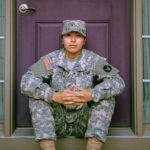
Russell Moore Offers Gospel Hope for the Storm-Tossed Family
Interview by Aaron Wilson
When it comes to dealing with family, Russell Moore, president of the Ethics and Religious Liberty Commission of the Southern Baptist Convention, thinks many people often feel “lost at sea.”
His new book, The Storm-Tossed Family: How the Cross Reshapes the Home, explores how the gospel helps Christians navigate the hazards and hope of family life. Facts & Trends spoke with Moore about the family as a picture of the gospel and the spiritual warfare that brings.
Is there something healthy about recognizing the scariness that comes with being part of a family in a fallen world?
I think so. Many people assume there’s a set of skills someone masters, and from that point forward family life is supposed to be tranquil and easy. Sometimes then, people who have ongoing issues to deal with in their families feel as though they’re failures.
My response is to say, “Family is going to be difficult because family is spiritual warfare.” Even if you don’t have problems in one area of family, you will have problems in other areas of family.
In order to work toward healthy families we must grapple with the fact that all of us are part of a dysfunctional family, because we are all rooted in the family history of Adam.
The pages of this book drip with allusions to the crucifixion. Why is it so important to see the family through a gospel lens?
To understand what it means to be in a family we have to understand why family is here. And family isn’t here for its own sake. It’s not just a Darwinian device for propagating the species.
God could have created us to just subdivide like an amoeba. Instead, God has given us family as a picture of the gospel—and that’s the reason why family is so difficult. There are spiritual beings in this cosmos that despise the gospel and want to root out every picture of it.
A family is a gospel track—in many cases a tattered gospel track—but a gospel track nonetheless. That helps us understand both why family can be so beautiful and meaningful and why family can also be so difficult.
You write, “The way to reclaim the family is to crucify our family values.” What do you mean by that?
Jesus called us to crucify our entire lives when He said, “Take up your cross and follow Me.” Jesus says the one who is to save his life must lose it. I think the Bible teaches the same thing about the family.
The one who would save his or her family must first realize the family is not ultimate.
Many of the people I talk to who are considering walking out on their marriages have convinced themselves of this super high view of family where they think, “My life is nothing unless my spouse meets every need I have.” So they grow in this sense of bitterness or resentment toward their spouse.
The same thing happens with parenting. You see all the time where a parent will treat his or her child, not as a unique person created in the image of God, but as the potential fulfillment of all that parent hopes and dreams for himself. Where does that end up? It ends up in disappointment and bitterness.
But if we understand the kingdom of God is first and family is pointing us to it, that gives us the freedom to pour ourselves out to the families we have—whether that’s our church family, nuclear family, or an extended family—to say, “I don’t have to be in my perfect idolized family to love it and in order to give myself to it.”
You write about how a correct view of the gospel affects practical aspects of family life like sex, parenting, dealing with family tensions, and aging. Why is it important for Christians to connect the dots between what we believe and how we process life in these spheres?
I think it’s important because that’s the way the Bible speaks. Think for instance about the book of Ephesians.
Paul gives a lot of attention to the sovereignty of God, to the sinfulness of humanity, to how God graciously saves us, and to what God is doing in the universe summing it all up in Christ. But then there’s a sense of working things out in practical terms with parenting and being parented in Ephesians, chapter 6.
If we neatly subdivide our convictions about God from the way we live as parts of communities, churches, or families, we’re missing what it is God seeks to do with us by integrating us into whole people who love God and love one another.
There are lots of Christian books about marriage and family. What does The Storm-Tossed Family add to the conversation?
So much of who we are is shaped and formed by our family, our upbringing, the models we’ve seen, and the families that we enter. The book is meant to help people identify the spiritual warfare that we can’t see going on in families.
I’d like the book to give a sense of hope to people who are navigating difficult waters or who are about to do so. They’re not alone, and there are reasons behind the struggles—reasons that have everything to do with the most important thing in the universe.
Who is this book for?
The Storm-Tossed Family is for everyone because everyone is part of a family in some way.
I hear churches say, “We’re really interested in reaching families.” But what they really mean is, “We’re going to reach 30-something parents with children.” Well, those are families, but they’re not the only families.
Everybody created by God is in the middle of a family crisis even if that person has never been married, has never had children, or even if that person doesn’t know his or her parents.
I wanted this book to speak to the mom in the minivan and the dad who’s trying to balance his work and his family and to speak to that single person who believes he may have no family when in fact he does by being part of the family of God.
The sorts of challenges we face together in the church are the same as those we face together as families. Learning to be a family at home can equip us to better serve in the church and learning to be a family in the church can equip us to be better families at home.
The Storm-Tossed Family releases September 15 and can be preordered now.

Aaron Wilson
Aaron is the team leader for The Gospel Project for Kids. He and his family are members of Redeemer Church in Hendersonville, Tennessee, where they serve together in the children’s ministry.












